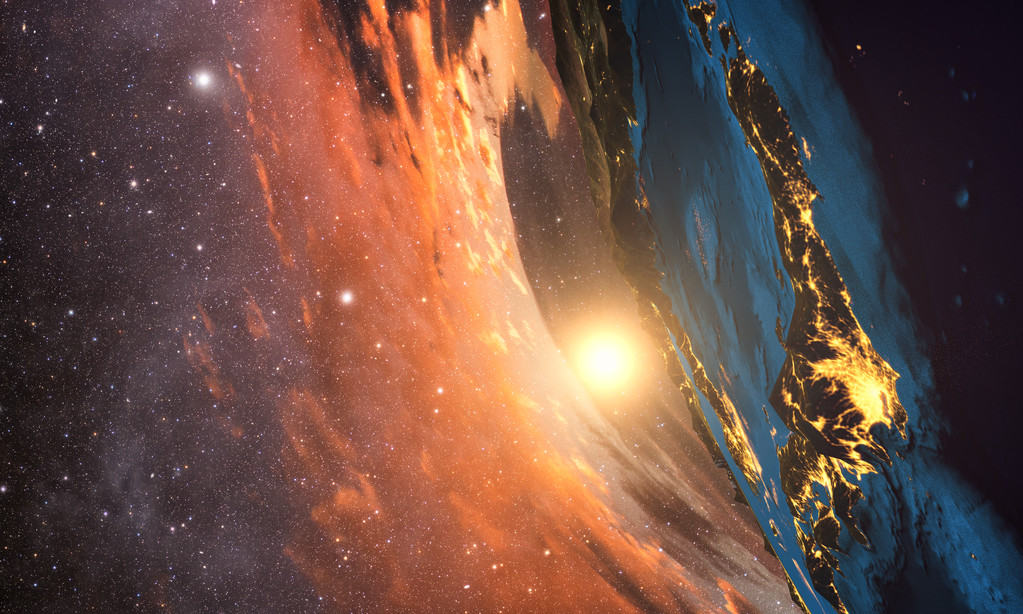Have you ever wondered about the mysterious connection between celestial events and the behavior of our planet’s environment?
In the complex web of interactions that occur in the vast expanse of space, one phenomenon stands out: eclipses.
These captivating events have intrigued scientists for centuries, and their influence on sea levels and atmospheric behavior continues to be a subject of scientific exploration.
But what exactly happens during an eclipse? And how does it affect our planet’s delicate balance? Let’s take a look…
Solar Eclipse Quiz
Test your Solar Eclipse knowledge with these quick 5 fun multiple-choice questions, which offer a fascinating insight into the celestial ballet of the sun, moon, and Earth.

The Connection Between Eclipses and Sea Level Changes
The occurrence of eclipses has been found to have a direct correlation with fluctuations in sea levels, as observed through rigorous scientific analysis and data collection.
It’s fascinating to delve into the intricate connection between these celestial events and the changes in our Earth’s environment.
When an eclipse takes place, the alignment of the Sun, Moon, and Earth creates a gravitational pull that affects the distribution of water on our planet.
This gravitational interaction leads to a temporary rise or fall in sea levels, known as tidal variations.
The influence of eclipses on sea levels is further amplified by atmospheric behavior, such as changes in air pressure and wind patterns.
Atmospheric Effects of Celestial Phenomena
As we explore the fascinating realm of celestial phenomena, it becomes evident that these events have significant atmospheric effects that shape our understanding of Earth’s environment.
One such celestial event is a solar eclipse, which can cause total or partial changes in the Earth’s atmosphere.
During a total solar eclipse, there’s a decrease in solar radiation reaching the Earth’s atmosphere, leading to a cooling effect on the upper atmosphere.
This cooling can alter ionospheric conditions, affecting communication and navigation systems that rely on refracting radio waves.
The ionosphere, which contains charged particles (ions), typically returns to its normal state after the eclipse event.
However, during the eclipse, sudden changes in ionospheric conditions can affect radio communications and gather data for space physics research.
Understanding how eclipses impact the ionosphere’s structure and cause temporary drops in electron density helps scientists monitor ionospheric variations and study the dynamics of Earth’s upper atmosphere.
These studies provide a unique opportunity to gather data and further our understanding of the atmospheric impact of celestial events on radio signals and GPS navigation.
Observing the Impact of Eclipses on Earth’s Environment
To understand the impact of eclipses on Earth’s environment, researchers closely observe the changes in atmospheric conditions and their effects on various aspects of our planet.
Solar eclipses induce significant alterations in our atmosphere, particularly in the ionosphere region at an altitude of 37 to 56 miles.
The temporary drop in ionization caused by decreased solar radiation leads to a cooling effect on the upper atmosphere.
This cooling affects the temperature structure of the ionosphere, causing variations in ionospheric densities and altitudes.
The reduction in electron density during solar eclipses can disrupt long-distance communication using radio waves in the high frequency range, impacting radio signals and GPS navigation systems.
Scientists have observed the formation of ionospheric anomalies during eclipses, which temporarily disrupt communication and navigation over the affected regions.
These observations provide valuable data to better understand the influence of celestial events on our planet’s atmosphere, wind patterns, surface energy fluxes, and even marine organism behavior.
Unveiling the Influence of Celestial Events on Sea Levels
Unveiling the influence of celestial events on sea levels requires a thorough analysis of the intricate relationship between astronomical phenomena and the dynamic behavior of Earth’s oceans.
While solar eclipses primarily impact the ionosphere’s structure and radio communication, they also have indirect effects on sea levels.
During a solar eclipse, as the Moon blocks the Sun’s rays, solar radiation levels decrease. When the eclipse ends and solar radiation returns to normal, the rapid change can lead to anomalies in the Earth’s upper atmosphere. These anomalies can disrupt radio signals and GPS navigation systems.
However, these changes also provide a unique opportunity for researchers to study the ionospheric response to sudden changes in solar radiation.
By understanding how celestial events impact the ionosphere, scientists can further radio science, change how radio waves are measured and monitored, and help advance physics research.
Understanding the Interplay Between Eclipses and Atmospheric Behavior
During the study of the influence of celestial events on sea levels, it becomes crucial to understand the interplay between eclipses and atmospheric behavior for a comprehensive analysis.
Solar eclipses have been found to cause temporary changes in ionization and electron density in the upper atmosphere.
Observing solar eclipses helps scientists understand the correlation between solar radiation changes and atmospheric temperature fluctuations.
These eclipses can also disrupt radio communications and affect high-frequency radio wave propagation and GPS navigation systems.
Scientists can use various tools, such as the Radio Science Citizen Investigation and the Ham Radio Science Citizen, which are open to volunteer amateur radio operators, to study these changes in ionospheric densities.
The research conducted during solar eclipses provides unique opportunities to study the ionospheric responses to sudden changes in solar radiation, contributing to an improved understanding of the ionosphere and atmospheric behavior.
Conclusion
The connection between celestial events, particularly eclipses, and Earth’s environment is a fascinating and complex topic.
Eclipses have a direct impact on sea levels through gravitational interactions and atmospheric behavior, causing temporary rises or falls in sea levels and altering ionospheric conditions.
These changes can lead to disruptions in communication and navigation systems, offering valuable opportunities for scientists to gather data and deepen our understanding of Earth’s upper atmosphere.
By studying these celestial events, we not only enhance our knowledge of space but also improve our ability to monitor and predict the effects of such phenomena on our planet’s environment.







